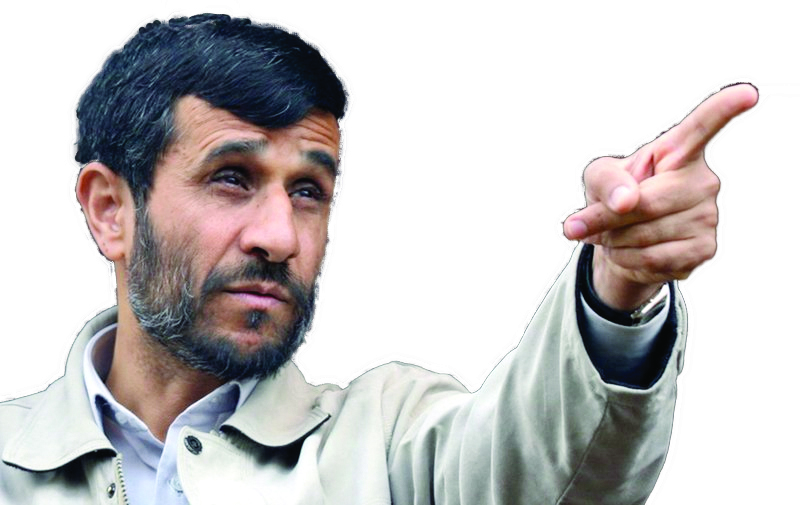Last Monday, September 24th, a group of 11 elected CISLA students one faculty member and one CISLA staff member traveled to New York City for a formal meeting with the President of Iran, Mahmoud Ahmadinejad. This is the second time that Connecticut College has been represented in this particular forum to participate in a question and answer session with Ahmadinejad. Our peers shared the assembly space with colleges such as Harvard, UPenn, Colombia, Princeton, NYU and Bard College.
After a three hour bus ride, a formal Persian dinner event where students from different institutions could mingle and a debriefing of Ahmadinejad’s travels up to that point in his trip, the students filed into an assembly room to begin the question and answer session.
Provided with simultaneous translation, Connecticut College student Aditya Harnal ’13 was called upon almost immediately to initiate the dialogue. He began by posing a question that the Conn group of students had been cultivating for days; in conversation, they considered topics ranging from women’s rights, Iran’s attitude toward homosexuality and foreign policy.
In the end Harnal began the conversation with the following question:
“Iran and the United States have shared a long and troubled relationship. In the early 1900s, great American friends to Iran such as Howard Baskerville and Morgan Schuster fought to support the constitutional movement that was developing at the time. Amidst mistrust between Iran and the British and French colonial powers, America was a trusted ally. However, several events have precipitated conflict over the past 60 years that have soured relations over time to where we find ourselves today. Three events in particular have appeared to have impacted this relationship, namely, i) The 1956 overthrow of Mohammed Mossadegh by the CIA and MI-6 ii) The Iranian Hostage Crisis in 1979 iii) George Bush’s axis of evil speech in 2002. In your opinion, how did each of these events transform the relationship between Iran and the United States, and please suggest three of the most pragmatic courses of action for both countries to take in order to restore relations between the two countries, if you deem it possible or desirous.”
Ahmadinejad responded warmly and at length to Conn’s thoughtful question, at times apologizing on behalf of his country for mistakes Iran may have made in the past. The President took a historical and foreign policy related approach in answering, agreeing that the actions taken by the U.S mentioned in Conn’s question were indeed critical in U.S-Iranian relations.
In addition to such critical points of development in foreign relations, Ahmadinejad addressed other junctures of tension in the recent past, as Ryan Dillon ’13 elaborated, “[in reference to the U.S’s consistent support of Mohammed Reza Shah post 1956] he said the U.S propped up a regime that was terrible to the Iranian people. Another main factor leading to a poor relationship between the U.S. and Iranian relationship [in the eyes of Ahmadinejad], was the U.S support of Saddam Hussein during the Iran-Iraq War in the 1980’s. He argued that Iran was attacked by an aggressor, and the U.S supported that aggressor.”
In addressing the Israeli-Palestinian conflict, Ahmadinejad acknowledged U.S support of the “Zionist regime” as destructive to U.S-Iranian cooperation, though he admitted his hope for future improvement and cooperation with the United States.
Aside from these topics of conversation, Ahmadinejad responded and discussed at length to other student groups in the crowd, touching upon “the nuclear issue, Syria, and the role of Iran as a key player on the international stage.” Though both Harnal and Dillon admit their strong stances of opposition to a majority of President Ahmadinejad’s policies and beliefs, Harnal commented, “he is a very persuasive speaker, his arguments were simple but powerful,” while Dillon agreed, “[Ahmadinejad’s] arguments were filled with simple analogies, yet they were effective and made me think… he was very pleasant in answering questions and was nice enough to spend two hours with us.”
Although the CISLA department cannot bring all interested Conn students to the dinner and discussion with the President of Iran, they are hoping to build upon their relationship with Iranian Embassy member Dr. Vahid Karimi, and plan on eventually inviting him to come speak at Conn, if the community and student body so desire.










Why would students waste time talking to a fool like Ahmadinejad? Dillon thinks he was very pleasant? Well Hitler liked dogs, it doesn’t mean he was a nice man. Israel is the only free country in the Middle East. The rest are Islamic dictatorships with appalling human right records. Women are treated like property in Muslim countries.